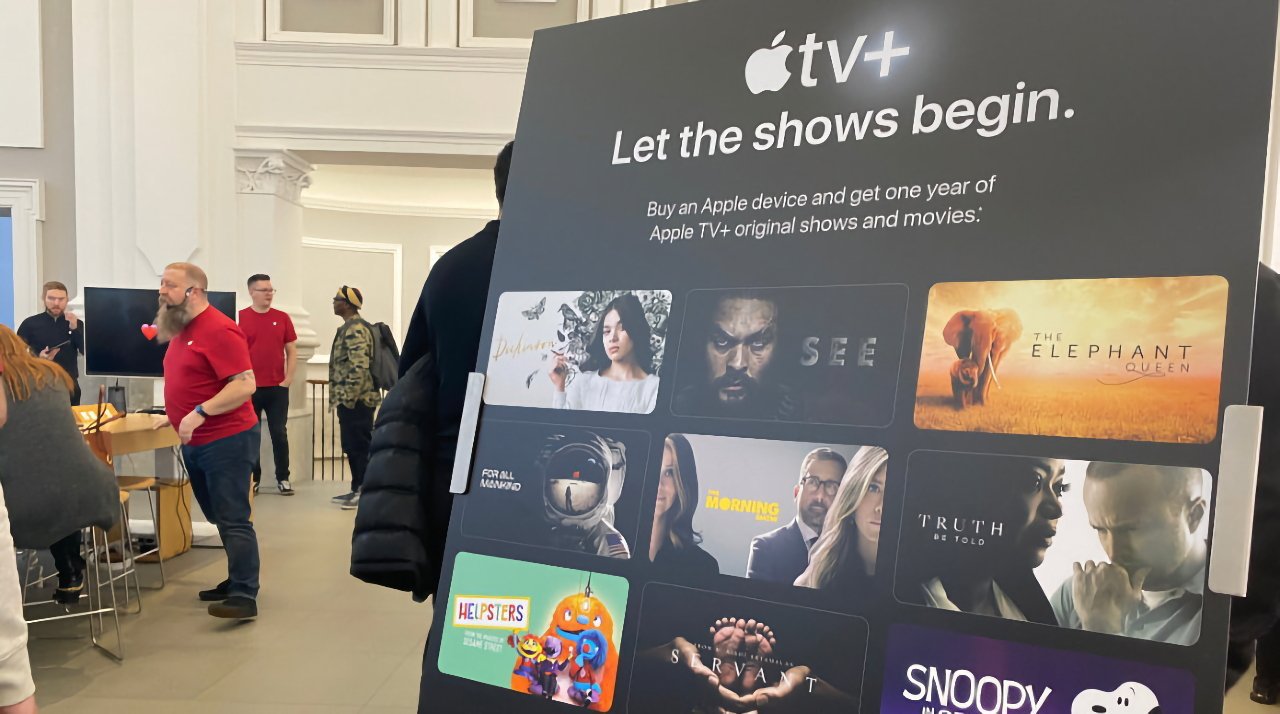Apple TV+ is losing billions of dollars -- as planned and expected
Apple is reportedly cutting its Apple TV+ budget as this is its only service that is losing money, but the report conveniently leaves out that the service has always been a loss-leader with benefits that can't have a dollar-value.

Apple TV+ being promoted in an Apple Store in 2019
The specific claim of the new report is that Apple loses $1 billion per year on Apple TV+. Of course it does.
It should be more, really, since the budget for Apple TV+ films alone, not even including serialized shows like "Severance," was originally set at $1 billion annually.
While it sounds a lot -- because it is -- television and films are costly to make. Apple's $1 billion per year is even on the low side, with Netflix estimated to be spending $18 billion in 2025.
Apple TV+ has also reportedly spent $20 million per episode of "Severance," but then it's said to have made the company back $200 million in new subscribers.
That per-episode cost for "Severance" was driven up by issues around COVID filming delays, but it's still not that unusual. Netflix reportedly spent $30 million per episode of "Stranger Things" season four.
It has been reported before that Apple has trimmed its Apple TV+ budget, but this new report by The Information bizarrely believes Apple's streamer is in trouble because it works the same way Netflix does. That's not true -- Netflix makes some money through international rights deals, but most of it comes from subscribers and advertisers.
Apple has no advertisers on Apple TV+ -- at least not yet -- and admittedly fewer subscribers than Netflix. But then Netflix gets no money from having, say, an incredibly popular hardware device that is its main product line.
What this report misses is that there is not one thing Apple does that is not directly tied to the rest of its business, most specifically the iPhone.
So it is doubtlessly entirely true that Apple TV+ is the only Apple Service that loses that much money, it's equally doubtless that it's one that drives buyers to the iPhone and other devices. And the sum total of Apple services including Apple TV+ helps keep people on Apple's platform, even if it has recently released Apple TV+ on Android.
Then there's the way that "Severance" and "Ted Lasso" have positioned Apple in the market. Both have become cultural phenomenons right now -- and they are always going to be here.
In television production, there are periodically times when networks concentrate on entertainment series, otherwise known as shiny floor shows. Without question, it is incredibly cheaper to produce another season of "Dancing with the Stars" than it is to make "Monarch: Legacy of Monsters," and entertainment shows get brilliant ratings.
They just do not get any repeat value. NBC will never re-show a whole season of "America's Got Talent," for instance.
But "Ted Lasso" and "Severance" are bringing in audiences now and they will continue to do so for years, perhaps even decades.
Shows like that are also tentpoles for a streaming service, since they project an image of great, well-made series. It's Apple's famous halo effect, just being applied to television and films.
So even if there were no direct income to Apple, it's as impossible to estimate its financial benefit as it is to deny that Apple TV+ helps promote the company.

You immediately recognize "Severance" and that's part of how Apple TV+ raises Apple's profile -- image credit: Apple
Plus there is an income for Apple in subscriptions to Apple TV+, although there it is probably also a factor in pushing subscriptions to the whole Apple One bundle. And Apple, too, has deals with other firms such as airlines, or while it's not clear if Apple TV+ is directly profiting, also now sales of its shows to other markets.
Then compare Apple TV+ to other Apple Services and it's clear how it was always going to cost the company some serious cash. A subscription to the service now costs $9.99/month, and for the same price you could instead of 2TB of iCloud storage.
Only, iCloud storage does not cost Apple as much as making "F1" or buying "CODA."
This new report quotes a recent Variety interview with Netflix co-CEO Ted Sarandos who was asked what he thought of rival Apple TV+.
"I don't understand it beyond a marketing play, but they're really smart people," he said. "Maybe they see something we don't."
If Apple does see something else, it doesn't need to. Marketing is enough, what Apple TV+ brings to Apple is enough.
Which, frustratingly, is also the conclusion of this new report despite author Wayne Ma again starting off sounding like Apple is unexpectedly hemorrhaging money and will go out of business.
It's the same old story, Apple is doooooomed. Just don't let it be doomed until they've finished the next season of "Slow Horses."
Read on AppleInsider


Comments
But Apple can obviously more than afford to speculate and like they say, Apple know what they are doing.
I do hope that something more is coming (let's say severance for the Vision Pro in 3D or something). Although I've given up hope that Apple can innovate like they used to in the 00's.
Right now this smells like a huge money drain with little to show for (except for Tim getting invited now to Hollywood events).
It’s called downstream impact (DSI). With a little analysis you can estimate this quite well. I’m sure Apple has a good handle on the incremental impact per customer from having Apple TV+ available. It’s not a loss making venture, it’s an investment.
I prefer Movies.
The Stories are Mediocre and production values are lower than movies.
And there are some who think of series as a really long movie that has been chopped up into more digestible chunks -- like chapters of a book.
Multi-part stories go back to the beginning of human civilization. Even the first known story -- the Epic of Gilgamesh -- has multiple chapters. And yes, you could make the Epic of Gilgamesh into a movie. Or a television series.
For sure, one thing a television series can do is go deeper into a story. A movie with a typical two hour runtime simply doesn't have enough space to capture complex or intricate details. We have seen them with many movies like the Lord of the Rings trilogy or the Harry Potter films. Go ahead and rewatch the LotR trilogy and count how many minutes Tom Bombadil appears.
Of course there's an opposite side to television series. The average runtime for a 1 hour television show is 42 minutes of content, the rest are commercials. So each TV episode needs to be around 42 minutes whereas a movie has no such rigid requirements.
So they are reviewing all of their current content projects and only keeping the proven ones. They will certainly unveil others in the future but producers will be on an exceptionally short leash.
2025 Apple is lightyears away from 2005 Apple or even 2015 Apple. That's just the reality of what Apple (and the rest of the world) has become.
Then there's the fact that Apple never remembers what you've bought, so you get suggestions for stuff you've already watched and don't get reminders to buy series/sequels that you have bought. I suspect that some of the loss is fewer purchases of third party content, because they are trying to push Apple TV+ content. OK, but it shouldn't mean you have to sacrifice one for the other.
Then there's the lack of simplicity in the interface. sometimes the options/content is best accessed by scrolling down and left to right, sometimes by scrolling counterclockwise, etc., etc. What happened to simple and intuitive interfaces?
Still, for Chernobyl, Slow Horses, and others in that class, I'll forgive them almost anything.
Once again, it boggles the mind that people can't comprehend the pretty simple business model that Apple operates right out in the open.
Apple sells high-quality computers at a premium price. Everything else they do supports that endeavor. They design their own bespoke operating systems that are exclusive to the computers they sell. The close cooperation between those two operations assure that Apple's computers work really well, and maintain a very high level of customer satisfaction. The also create some other computer applications that increase the utility of the computers they sell. Similarly, they provide services and content that create considerable added value to the computers that they sell. Because their primary revenue stream is from the computers that they sell, their customers are the people who buy the computers; the users, if you will.
So here we are. I can explain this to the Netflix guy. For Apple TV+, Apple produces a relatively small stable of high-quality original series and films which yield a pretty high "hit rate" among viewers, as compared to their competition. They charge a comparatively low subscription fee, so far with no advertising-supported "cheaper" options. They supplement their original material with a very small catalog of licensed film and TV that usually relates to the stars or directors of their exclusive content. They also offer a rental and purchase service of other TV and film content. All this is in service of selling Apple hardware: iPhones, iPads, Macs and AppleTV boxes. Even the AppleTV app that's available on non-Apple hardware is, like the similarly available Apple Music app, is intended as a means to draw new customers into the Apple ecosystem, driving sales of Apple hardware to "switchers" from other hardware brands. So AppleTV+ could be crudely understood as a "marketing play," but it's not really. That term implies a temporary gimmick that's not consistent with Apple's business model.